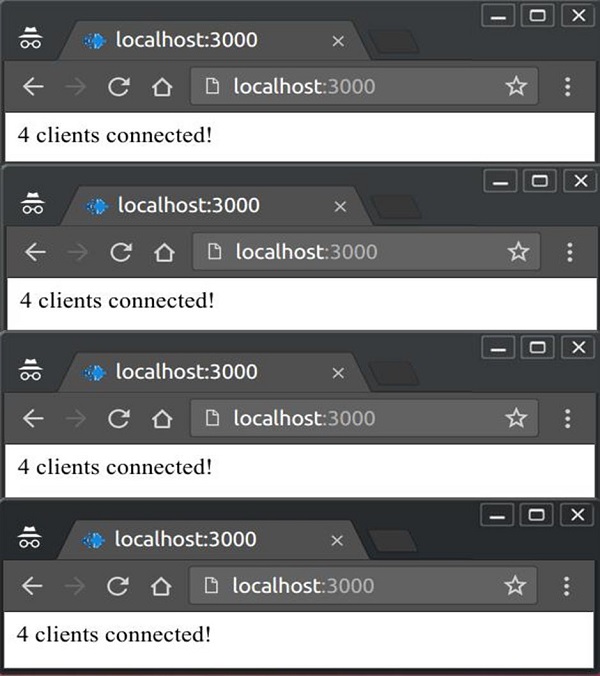
Socket.IO - Broadcasting
Broadcasting means sending a message to all connected clients. Broadcasting can be done at multiple levels. We can send the message to all the connected clients, to clients on a namespace and clients in a particular room. To broadcast an event to all the clients, we can use the io.sockets.emit method.
Note − This will emit the event to ALL the connected clients (event the socket that might have fired this event).
In this example, we will broadcast the number of connected clients to all the users. Update the app.js file to incorporate the following −
var app = require('express')();
var http = require('http').Server(app);
var io = require('socket.io')(http);
app.get('/', function(req, res){
res.sendFile('E:/test/index.html');
});
var clients = 0;
io.on('connection', function(socket){
clients++;
io.sockets.emit('broadcast',{ description: clients + ' clients connected!'});
socket.on('disconnect', function () {
clients--;
io.sockets.emit('broadcast',{ description: clients + ' clients connected!'});
});
});
http.listen(3000, function(){
console.log('listening on localhost:3000');
});
On the client side, we just need to handle the broadcast event −
<!DOCTYPE html>
<html>
<head><title>Hello world</title></head>
<script src="/socket.io/socket.io.js"></script>
<script>
var socket = io();
socket.on('broadcast',function(data){
document.body.innerHTML = '';
document.write(data.description);
});
</script>
<body>Hello world</body>
</html>
If you connect four clients, you will get the following result −

This was to send an event to everyone. Now, if we want to send an event to everyone, but the client that caused it (in the previous example, it was caused by new clients on connecting), we can use the socket.broadcast.emit.
Let us send the new user a welcome message and update the other clients about him/her joining. So, in your app.js file, on connection of client send him a welcome message and broadcast connected client number to all others.
var app = require('express')();
var http = require('http').Server(app);
var io = require('socket.io')(http);
app.get('/', function(req, res){
res.sendFile('E:/test/index.html');
});
var clients = 0;
io.on('connection', function(socket){
clients++;
socket.emit('newclientconnect',{ description: 'Hey, welcome!'});
socket.broadcast.emit('newclientconnect',{ description: clients + ' clients connected!'})
socket.on('disconnect', function () {
clients--;
socket.broadcast.emit('newclientconnect',{ description: clients + ' clients connected!'})
});
});
http.listen(3000, function(){
console.log('listening on localhost:3000');
});
And your html to handle this event −
<!DOCTYPE html>
<html>
<head><title>Hello world</title></head>
<script src="/socket.io/socket.io.js"></script>
<script>
var socket = io();
socket.on('newclientconnect',function(data){
document.body.innerHTML = '';
document.write(data.description);
});
</script>
<body>Hello world</body>
</html>
Now, the newest client gets a welcome message and others get how many clients are connected currently to the server.